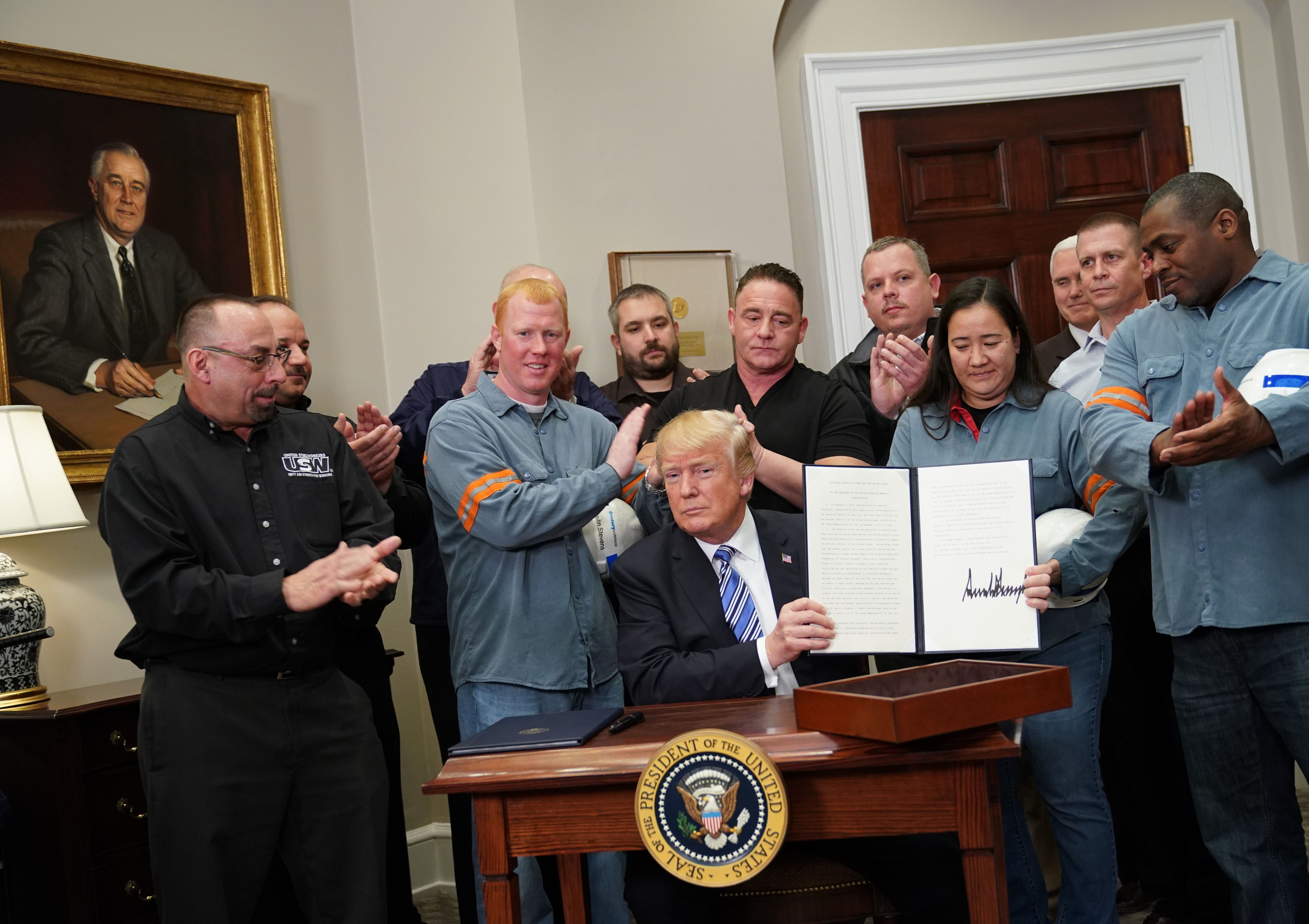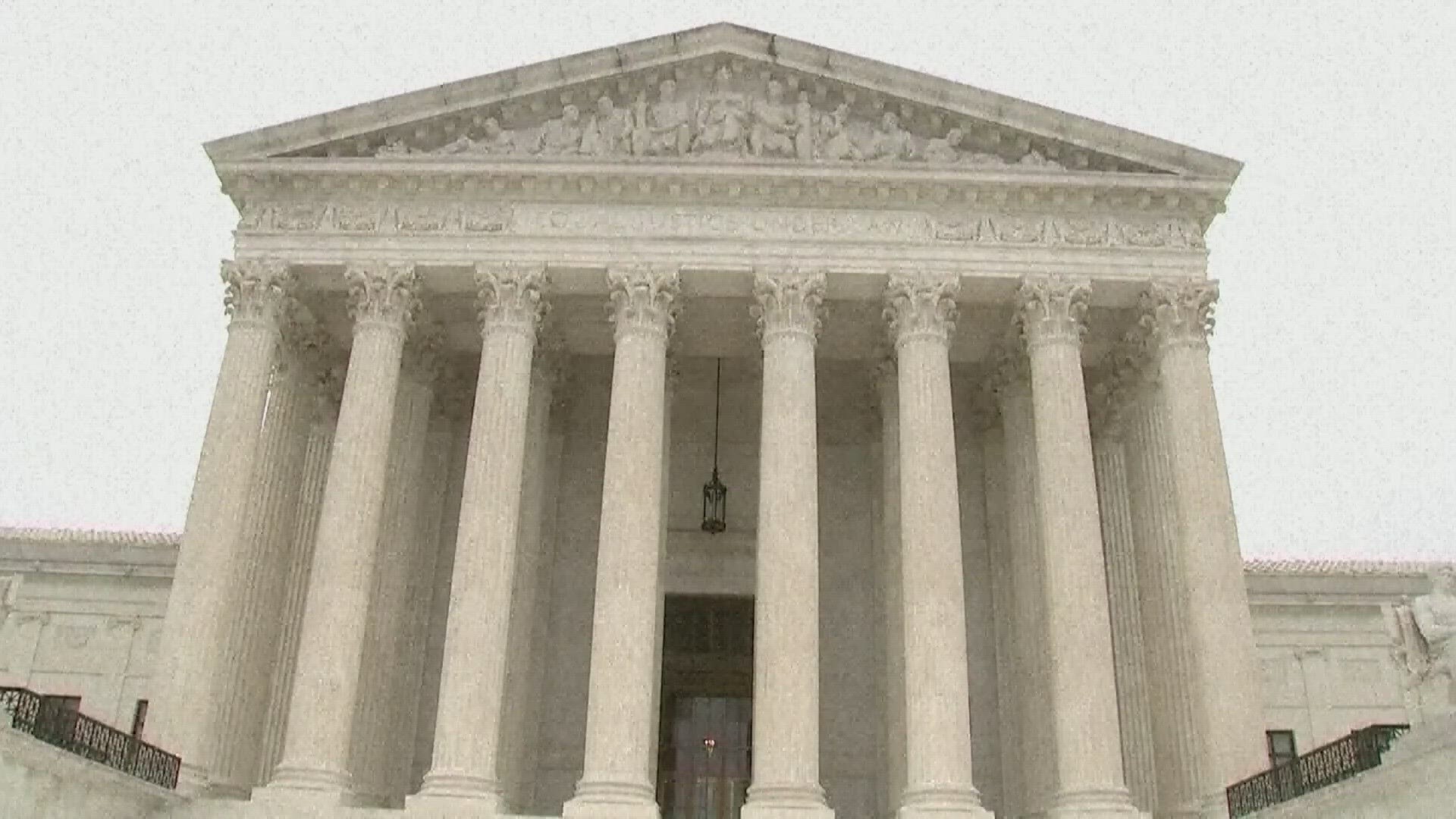Despite warnings by allies that a trade war will increase prices for consumers worldwide, President Trump signed proclamations Thursday imposing tariffs on steel and aluminum imports and said they are designed to protect American industries.
In statements from the White House, Trump said his plan does exempt Canada and Mexico from the tariffs, pending the outcome of ongoing trade negotiations, and allows other countries to apply for relief from the new duties.
"We have to protect and build our steel and aluminum industries, while at the same time showing great flexibility and cooperation toward those that are really friends of ours," Trump said while surrounded by steel and aluminum workers invited to the White House.
He also described the move as "vital to our national security," and said more trade policy changes are on the way.
Trump said there would be 25% tariffs on steel and 10% on aluminum, but there would be exemptions and possible changes.
"I'll have a right to go up or down, depending on the country, and I'll have a right to drop out countries or add countries," he told his Cabinet earlier in theb day. "We just want fairness. Because we have not been treated fairly by other countries."
The new tariffs take effect in 15 days.
The European Union and other allies have threatened to retaliate with tariffs of their own on American products, from Florida orange juice to Wisconsin motorcycles to Kentucky bourbon. Trump's decision "will put thousands of European jobs in jeopardy and it has to be met by firm and proportionate response," said Cecilia Malmström, the EU commissioner for trade.
In addition to threatening to go after American products, other countries ridiculed Trump's claim that the tariffs serve the need of national defense, saying the penalties fall more on allies like Canada than potential adversaries like China.
Many fellow Republicans also objected to Trump's tariffs, predicting a trade war that will increase costs for consumers everywhere.
Outgoing Sen. Jeff Flake, R-Ariz., who vowed to introduce legislation nullify Trump's action, ridiculed the notion of "flexible" tariffs: "What does that mean? One day you wake up and you say, ‘I don’t like Australia?’ ... That’s unbelievable.”
The critics include House Speaker Paul Ryan, R-Wisc., who said that "I'm just not a fan of broad based and across the board tariffs because there are a lot of unintended consequences."
Trump justified the decision by citing "shuttered plants and mills," laid-off workers, and "the decimation of entire communities," all the result of what he called decades of unfair foreign trade practices that targeted U.S. industries. Economists said automation has killed off more factory jobs, and that free trade has bolstered many sectors of the U.S. economy.
During the signing ceremony, Trump invited some of the steel workers, hard hats in hands, to speak about how their town have been hurt by the decline of the industry.
The trade debate played a major role in Trump's 2016 presidential campaign.
During the Cabinet meeting, Trump said he would flexible with "real friends." In addition to Canada and Mexico, Trump mentioned Australia — "we have a trade surplus with Australia" — while criticizing Germany for what he considers a lack of defense spending.
"We have some friends and some enemies, where we have been tremendously taken advantage of over the years, on trade, and on military," Trump said.
Trump said Canada and Mexico, the U.S. partners in the North American Free Trade Agreement, could avoid tariffs if they grant concessions during ongoing negotiations to re-work NAFTA, a trade deal the president has long criticized.
"With Mexico and Canada, we're going to be throwing NAFTA into the loop," Trump told his Cabinet, though officials in those countries have denounced the president's plan to link tariffs to the long-term trade deal.
Trump announced his pledge in a surprise move a week ago, telling a group of executives he would impose 25% tariffs on steel imports and 10% on aluminum imports.
The tariff issue created major divisions within the White House itself, and led in part to this week's resignation announcement by top economic adviser Gary Cohn.
During his session with aides, Trump noted that it would be Cohn's last Cabinet meeting. He also joked about his soon-to-be-ex-aide's support of free trade, saying that Cohn “may be a globalist, but I still like him."
A number of Republicans, nominal allies of Trump, have criticized the tariffs.
House Republicans focused on trade, however, were not as hard on Trump as their Senate colleagues.
Rep. Kevin Brady, the Texas Republican who chairs the Ways and Means Committee, said exempting Canada and Mexico was “a good first step.”
“I urge the White House to go further to narrow these tariffs so they hit the intended target – and not U.S. workers, businesses, and families,” Brady said.
Rep. David Reichert, R-Wash., said the process for excluding countries needs to be effective.
“With 40% of jobs tied to trade in my home state of Washington, we cannot take actions that hurt the ability of our exporters to sell their American-made goods and services around the world,” said Reichert, chairman of the trade subcommittee of Ways and Means.
In a letter released Wednesday, 107 House Republicans led by Brady urged Trump to “tailor” the tariffs to punish “bad actors who trade unfairly and hurt America” such as China.
Sen. Charles Schumer, D-N.Y., minority leader in the Senate, said he sympathizes with Trump's criticism of trade rules, but the main culprit is China. Trump's plan doesn't address the Chinese, he said, because other countries supply more steel and aluminum to the U.S.
"Instead of getting right at China, the president’s across-the-board tariffs will cause more damage to key allies and other domestic industries," Schumer said. He also hit "the haphazard way these tariffs were put together," and that Trump "makes up his mind one day and changes it the next."
Trump cast the tariffs at a first step in a series of trade changes. During the signing ceremony, he outlined a "reciprocal tax" to combat duties that China and other countries place on U.S. products.
Like other business groups, the National Retail Federation called the tariffs "a self-inflicted wound" that will lead to "higher prices for products ranging from canned goods to cars to electronics."
Some economists defended Trump's plan, saying trade has sucked the life out of American manufacturing.
Peter Morici, a business professor at the University of Maryland, tweeted that Trump "is not starting a trade war" because "we are already in one," especially with China.
"The other side has bazookas & we have been using water pistols," Morici said. "China has targeted one U.S. industry after another, thrown millions of Americans out of work. Time to fight back."
Contributing: Herb Jackson


